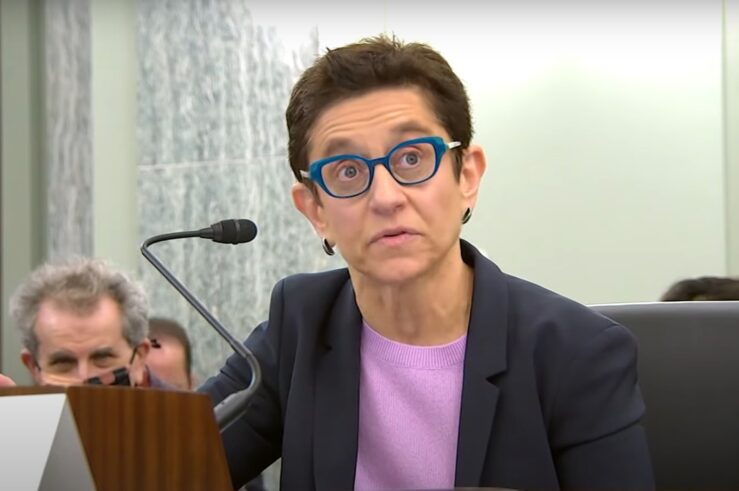Showing archive for: “Broadband”
Two FCC Commissioners Walk Into a Bar
Former FCC Commissioners Have Some Thoughts Writing with Kirk Arner in RealClearMarkets, Harold Furchtgott-Roth—formerly of the Federal Communications Commission (FCC)—comments on the Spectrum Auction Reauthorization Act, recently passed out of the House Energy and Commerce Committee. Arner and Furchtgott-Roth note that reauthorizing spectrum auctions is a “good and necessary idea,” but take issue with the “$23 billion Ponzi ... Two FCC Commissioners Walk Into a Bar
Dynamic Competition Proves There Is No Captive Audience: 10 Years, 10G, and YouTube TV
In Susan Crawford’s 2013 book “Captive Audience: The Telecom Industry and Monopoly Power in the New Gilded Age,” the Harvard Law School professor argued that the U.S. telecommunications industry had become dominated by a few powerful companies, leading to limited competition and negative consequences for consumers, especially for broadband internet. Crawford’s ire was focused particularly ... Dynamic Competition Proves There Is No Captive Audience: 10 Years, 10G, and YouTube TV
To Infinity and Beyond: The New Broadband Map Has Landed!
Announced with the sort of breathless press release one might expect for the launch of a new product like Waystar Royco’s Living+, the Federal Communications Commission (FCC) has gone into full-blown spin mode over its latest broadband map. This is, to be clear, the map that the National Telecommunications and Information Administration (NTIA) will use ... To Infinity and Beyond: The New Broadband Map Has Landed!
Whatcha Gonna Do When the Well Runs Dry?
As the U.S. House Energy and Commerce Subcommittee on Oversight and Investigations convenes this morning for a hearing on overseeing federal funds for broadband deployment, it bears mention that one of the largest U.S. broadband-subsidy programs is actually likely run out of money within the next year. Writing in Forbes, Roslyn Layton observes of the Affordable Connectivity Program ... Whatcha Gonna Do When the Well Runs Dry?
What Transmission Markets Can Learn from the FCC’s Pole-Attachment Problem
Large portions of the country are expected to face a growing threat of widespread electricity blackouts in the coming years. For example, the Western Electricity Coordinating Council—the regional entity charged with overseeing the Western Interconnection grid that covers most of the Western United States and Canada—estimates that the subregion consisting of Colorado, Utah, Nevada, and ... What Transmission Markets Can Learn from the FCC’s Pole-Attachment Problem
To Close the Digital Divide, Broadband Infrastructure Funds Must Be Spent Efficiently
States seeking broadband-deployment grants under the federal Broadband Equity, Access, and Deployment (BEAD) program created by last year’s infrastructure bill now have some guidance as to what will be required of them, with the National Telecommunications and Information Administration (NTIA) issuing details last week in a new notice of funding opportunity (NOFO). All things considered, ... To Close the Digital Divide, Broadband Infrastructure Funds Must Be Spent Efficiently
The Return of (De Facto) Rate Regulation: Title II Will Slow Broadband Deployment and Access
President Joe Biden’s nomination of Gigi Sohn to serve on the Federal Communications Commission (FCC)—scheduled for a second hearing before the Senate Commerce Committee Feb. 9—has been met with speculation that it presages renewed efforts at the FCC to enforce net neutrality. A veteran of tech policy battles, Sohn served as counselor to former FCC ... The Return of (De Facto) Rate Regulation: Title II Will Slow Broadband Deployment and Access
The FTC’s Privacy Report Fails to Justify Asymmetric Regulation of ISPs
Others already have noted that the Federal Trade Commission’s (FTC) recently released 6(b) report on the privacy practices of Internet service providers (ISPs) fails to comprehend that widespread adoption of privacy-enabling technology—in particular, Hypertext Transfer Protocol Secure (HTTPS) and DNS over HTTPS (DoH), but also the use of virtual private networks (VPNs)—largely precludes ISPs from ... The FTC’s Privacy Report Fails to Justify Asymmetric Regulation of ISPs
The BIF Offers a Good First Step for Broadband, but the Devil Will Be in the Details
Capping months of inter-chamber legislative wrangling, President Joe Biden on Nov. 15 signed the $1 trillion Infrastructure Investment and Jobs Act (also known as the bipartisan infrastructure framework, or BIF), which sets aside $65 billion of federal funding for broadband projects. While there is much to praise about the package’s focus on broadband deployment and ... The BIF Offers a Good First Step for Broadband, but the Devil Will Be in the Details
How US and EU Competition Law Differ
U.S. and European competition laws diverge in numerous ways that have important real-world effects. Understanding these differences is vital, particularly as lawmakers in the United States, and the rest of the world, consider adopting a more “European” approach to competition. In broad terms, the European approach is more centralized and political. The European Commission’s Directorate ... How US and EU Competition Law Differ
A First Glance at the Biden Executive Order on Competition: The Good and the Bad (Including Much that Looks Ugly)
The Biden Administration’s July 9 Executive Order on Promoting Competition in the American Economy is very much a mixed bag—some positive aspects, but many negative ones. It will have some positive effects on economic welfare, to the extent it succeeds in lifting artificial barriers to competition that harm consumers and workers—such as allowing direct sales ... A First Glance at the Biden Executive Order on Competition: The Good and the Bad (Including Much that Looks Ugly)
Build Broadband Better: Focus on Competition, Not Competitors
President Joe Biden named his post-COVID-19 agenda “Build Back Better,” but his proposals to prioritize support for government-run broadband service “with less pressure to turn profits” and to “reduce Internet prices for all Americans” will slow broadband deployment and leave taxpayers with an enormous bill. Policymakers should pay particular heed to this danger, amid news ... Build Broadband Better: Focus on Competition, Not Competitors












